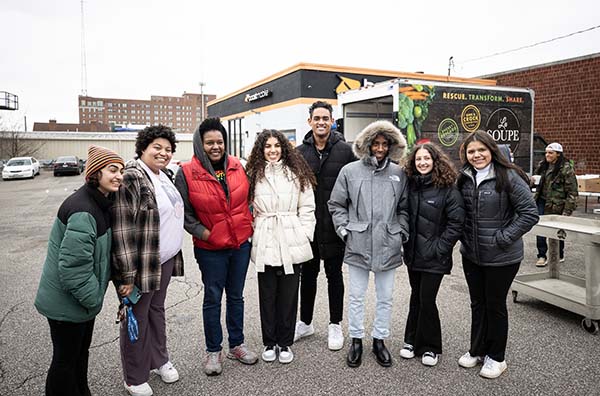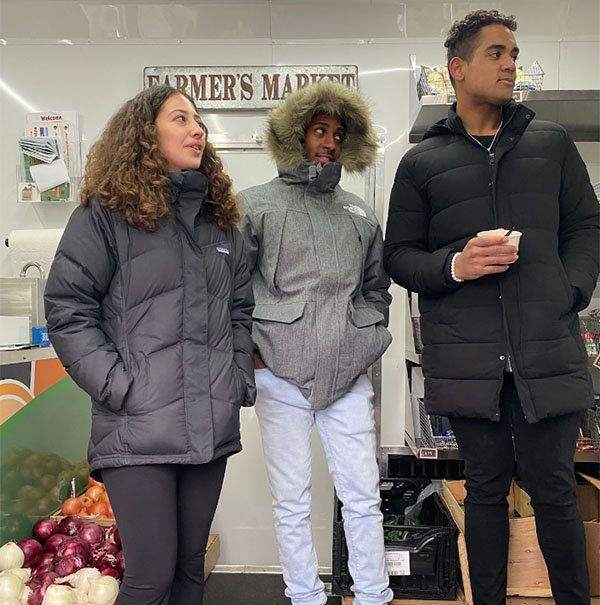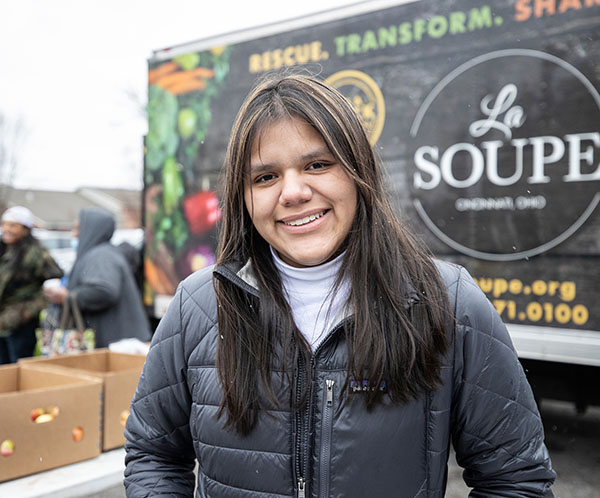Miami students get involved with Cincinnati area food insecurity initiatives
A day of immersive learning leads to new appreciation for ongoing community efforts

Miami students get involved with Cincinnati area food insecurity initiatives
For Victoria Castel, addressing the challenges of food insecurity is both a passion and a science.
“I have always felt drawn to this topic, starting as a grocery cashier when I was 16 years old,” Castel said. Now a junior at Miami, she is a Data Analytics major with a minor in Social Justice and Inequalities who has just completed a winter term internship with Freestore Foodbank. The internship allowed her to combine her expertise in data sciences with her passion for keeping communities fed.
“The Freestore is in the process of finishing their new building and was curious if they should move from their Liberty Street location to about two miles west of where they are now,” she said. “I am using my coding skills to analyze client data and come to a conclusion.”
Castel recently joined the other nine students of Miami’s Social Justice Internship cohort at a food distribution event sponsored by the Walnut Hills Redevelopment Foundation. The weekly event is a collaboration with neighborhood partners such as La Soupe, Freestore Foodbank's Healthy Harvest Mobile Market, and other community organizations. “I had read and heard about this initiative through Freestore Foodbank and after spending two weeks behind the scenes, it was amazing to be able to see what they had been talking about,” she said.

In fact, Victoria’s behind-the-scenes experience was part of the reason these Miami students found themselves present at this event. Visiting Instructor of Social Justice Mark Curnutte ’84, who leads the winter term Social Justice Internship Program, said the students’ involvement in the event happened organically. “Several students independently in their internships ... learned of La Soupe, a food rescue organization combating hunger,” he said. With the students’ encouragement, he set up a day of community service for the group instead of their previously scheduled day of classroom conversation. “They said, ‘We sit and talk every night when we get home, among ourselves, so let’s do a field trip.’”
A former Cincinnati Enquirer reporter of 25 years, Curnutte’s existing connections with the Walnut Hills Redevelopment Foundation helped structure the day’s events. Following a tour of La Soupe, Curnutte took the students to meet with the foundation and learn of its work. They then went together to volunteer at the food distribution event the foundation sponsors. For students, this day of immersive learning presented a chance to see how communities in the greater Cincinnati area were addressing food insecurity, even if their specific internships were focused on other aspects of social justice.

“I’m not interning at La Soupe or at the food bank or anything, but I’ve gotten to hear about it through a few friends,” said Isabella Turner, a junior at Miami who spent winter term interning at the Immigrant and Refugee Law Center. Reflecting on the food distribution work being done around her, Turner said it was “incredible to see the work that’s done in the greater Cincinnati area.”
Tajah Foster-Walker, a senior who spent winter term interning at the Legal Aid Society of Greater Cincinnati, also appreciated the chance to see the Mobile Market and La Soupe services in action. “It was really cool to go in, actually see it in real time and hear about all the different things that they do, and how honestly amazing the organization is, and how many good and great things they're doing for the community.”
For Curnutte, helping students see the work already happening in the community is key. “If you want to be a change agent and create equity and reduce inequality, there are things you can do and you don’t have to reinvent the wheel,” he said. “You can become a part of an organization. And I think that their minds get blown when they see all this happening.”